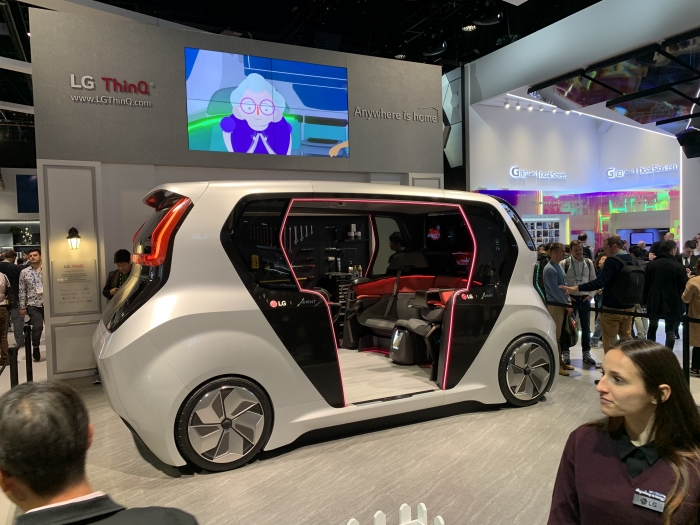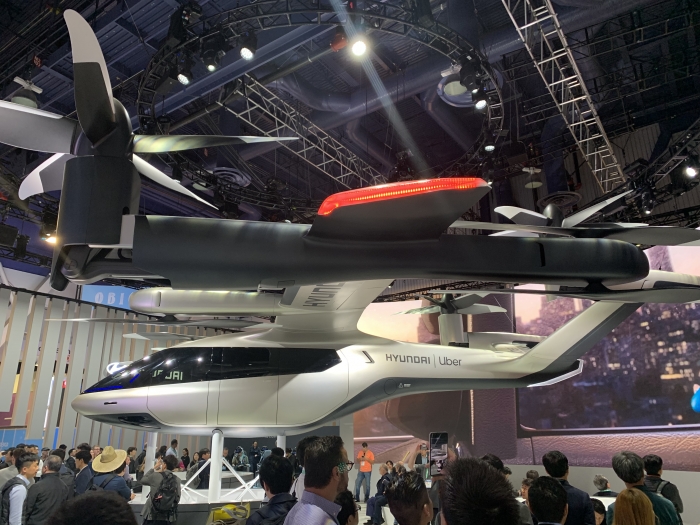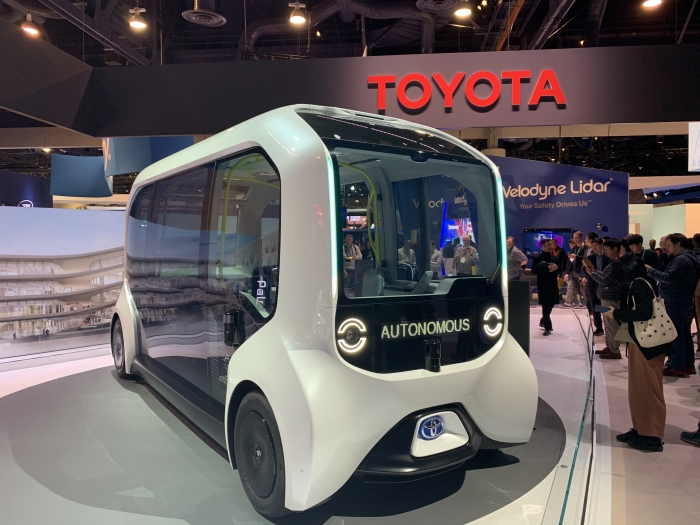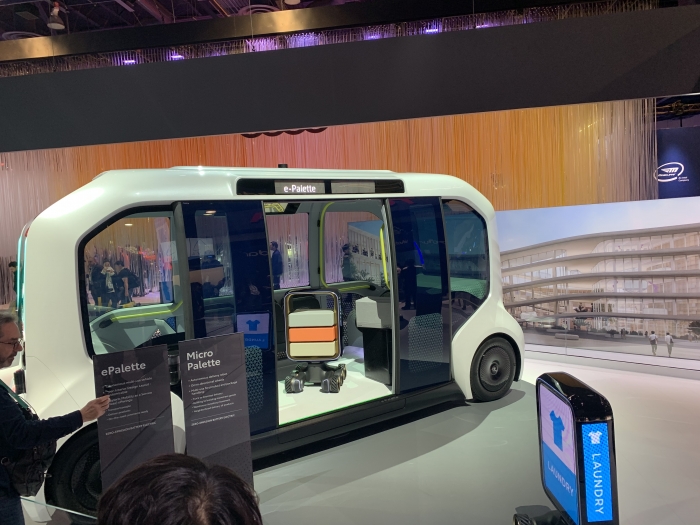Will driverless cars ever actually be a thing?
It seems to me that we are constantly getting closer. Every manufacturer now has lane assist, smart cruise control, etc. Some have automatic parking. They are working steadily towards it. When it happens it will be more of a "hey, when did that happen?" Sort of thing.
CES 2020 had a number of displays of driverless vehicles. Including people carrying drones.
Maybe we should have driverless buses first. Then leverage the efficiency of autonomous vehicles to drastically increase the bus route network and lower the costs.
PVW said:
Maybe we should have driverless buses first. Then leverage the efficiency of autonomous vehicles to drastically increase the bus route network and lower the costs.
this definitely seems to be what the manufacturers have in mind on some level. The CES exhibits of driverless vehicles were focused on ride sharing on some level. Hyundai had a vehicle that looked like an autonomous streetcar.
ml1 said:
PVW said:
Maybe we should have driverless buses first. Then leverage the efficiency of autonomous vehicles to drastically increase the bus route network and lower the costs.
this definitely seems to be what the manufacturers have in mind on some level. The CES exhibits of driverless vehicles were focused on ride sharing on some level. Hyundai had a vehicle that looked like an autonomous streetcar.
I feel that as so often happens in tech development, we're coming up on a fork in the path. Down one side, we can leverage our technology to radically expand opportunity for masses of people currently excluded or overly burdened. Imagine how radically life-changing cheap, reliable, extensive autonomous bus networks would be for all those folks working minimum wage you currently see waiting in the rain and cold for the NJ transit bus to come down route 10. Down the other fork, we have the option of just further entrenching the power of those already winning in our economy -- the dream of the executives and titans of industry lounging in their autonomous first-class carriages zooming down 280 to their city jobs. Seems like one fork's already getting most of the attention.
Tesla is the dominant electric carmaker in the industry — an impressive achievement in just over 15 years of existence. But it wants to be more — a purveyor of fully autonomous vehicles and the operator of a robotaxi service.
But unlike a lot of other companies in the spotlight for self-driving technology, such Cruise and Waymo, Tesla has a potentially big constraint: that its business is built around selling cars to consumers, just like traditional automakers, not simply picking up and dropping off in them.
That could lead it to miss out on the next big thing: the unowned car.
According to one article I read on the subject, weather conditions are a big issue. Bright sun/Sun glare, heavy rains, snow (covers the lines on the roads, ) and other weather related issues were all still problems that need to be solved.
However, eventually I think it will happen and most people will accept it.
yahooyahoo said:
That could lead it to miss out on the next big thing: the unowned car.
Nothing new about this. People have been leasing for years. Automakers love it. They make people want more than they can afford and then get them to pay forever.
FilmCarp said:
yahooyahoo said:
That could lead it to miss out on the next big thing: the unowned car.
Nothing new about this. People have been leasing for years. Automakers love it. They make people want more than they can afford and then get them to pay forever.
They aren't talking about leasing. It about fleet vehicles, which apparently Tesla does not focus on. Here is more from the article:
As the industry moves toward electricity and autonomy, one of the most compelling business models for a wannabe self-driving car company is as follows: operate a fleet of vehicles in a city where there are lots of riders who can access the service using smartphones, run those vehicles day and night, 24/7, and power them with electricity.
yahooyahoo said:
They aren't talking about leasing. It about fleet vehicles, which apparently Tesla does not focus on. Here is more from the article:
As the industry moves toward electricity and autonomy, one of the most compelling business models for a wannabe self-driving car company is as follows: operate a fleet of vehicles in a city where there are lots of riders who can access the service using smartphones, run those vehicles day and night, 24/7, and power them with electricity.
This is theoretically a major Uber and Lyft Buster. Since the fleet would own the vehicles, and there would be no need to compensate drivers for their time or wear and tear on their vehicles it could be offered at a lower price. Or operated at a higher profit margin. Probably that second one.
if it is something that could be made more economical than purchasing, insuring and maintaining your own vehicle it could certainly work. Especially in an area like here where people take a lot of short trips. For instance, you could offer a monthly pass that would allow you to take a certain number of trips, say for instance to and from the train station on a daily basis directly to your house. It might be worthwhile for a family that currently owns two vehicles to consider downsizing to just one.
mrincredible said:
yahooyahoo said:
They aren't talking about leasing. It about fleet vehicles, which apparently Tesla does not focus on. Here is more from the article:
As the industry moves toward electricity and autonomy, one of the most compelling business models for a wannabe self-driving car company is as follows: operate a fleet of vehicles in a city where there are lots of riders who can access the service using smartphones, run those vehicles day and night, 24/7, and power them with electricity.This is theoretically a major Uber and Lyft Buster. Since the fleet would own the vehicles, and there would be no need to compensate drivers for their time or wear and tear on their vehicles it could be offered at a lower price. Or operated at a higher profit margin. Probably that second one.
if it is something that could be made more economical than purchasing, insuring and maintaining your own vehicle it could certainly work. Especially in an area like here where people take a lot of short trips. For instance, you could offer a monthly pass that would allow you to take a certain number of trips, say for instance to and from the train station on a daily basis directly to your house. It might be worthwhile for a family that currently owns two vehicles to consider downsizing to just one.
In a lot of circumstances it's not that hard for a service to be more economical than actually owning a car. Back when I lived in Manhattan (Washington Heights) we used to rent Zipcars quite a bit before we decided to buy a car of our own.
While owning one of our own was more convenient, it didn't really make financial sense. We essentially never used it during the week and we could have rented a similar car every Saturday for the whole day from Zipcar for less. (Keep in mind we also paid for a garage for it.)
So why did we want a car? It's hard to say exactly, I guess you'd say convenience? Granted in our situation the car wasn't 100% convenient, it was an over 5 minute walk to our garage (although we'd sometimes pay to keep it in our co-op's drive on a Saturday night if a spot was available). We definitely felt like we had more freedom with our own car, but dollar-wise it wouldn't be hard to find cheaper options. (Freedom isn't free!)
From what I understand the kids today are not necessarily as interested in owning cars as we Gen Xers and older generations might be. If you could replace the convenience of owning a car (or two) and do it for the same money or less you might have a winner.
mikescott said:
According to one article I read on the subject, weather conditions are a big issue. Bright sun/Sun glare, heavy rains, snow (covers the lines on the roads, ) and other weather related issues were all still problems that need to be solved.
However, eventually I think it will happen and most people will accept it.
These are also major problems with the reliability of human driven cars. Autonomous vehicles do not need to be perfect, they just need to be marginally better than the aggregate of humans. Think about it -- if autonomous vehicles were as good as the average driver, they would by default be better than 50% of all drivers on the road today. That 50% of lousy drivers cause a disproportionate number of current accidents. It would be a significant safety improvement.
max_weisenfeld said:
These are also major problems with the reliability of human driven cars. Autonomous vehicles do not need to be perfect, they just need to be marginally better than the aggregate of humans. Think about it -- if autonomous vehicles were as good as the median driver, they would by default be better than 50% of all drivers on the road today. That 50% of lousy drivers cause a disproportionate number of current accidents. It would be a significant safety improvement.
My guess is the worst 10% of drivers drag the average well below the median.
mrincredible said:
max_weisenfeld said:
These are also major problems with the reliability of human driven cars. Autonomous vehicles do not need to be perfect, they just need to be marginally better than the aggregate of humans. Think about it -- if autonomous vehicles were as good as the median driver, they would by default be better than 50% of all drivers on the road today. That 50% of lousy drivers cause a disproportionate number of current accidents. It would be a significant safety improvement.
My guess is the worst 10% of drivers drag the average well below the median.
So we could get the benefits of self-driving vehicles today, simply by getting the bottom 10% off the roads?
It may be a question of perception. In 2018 there were about 100 fatalities per day in automobile accidents in the US. When's the last time that made the news?
Now imagine the headlines the first time a fully autonomous vehicle crash kills someone.
PVW said:
So we could get the benefits of self-driving vehicles today, simply by getting the bottom 10% off the roads?
If you want to use my guesswork to set transportation policy, get ready for a lot of rail infrastructure spending and an electric trolley network throughout SOMA.
I started this thread about 3 years ago. In that time, the prospects for a fully autonomous car have actually decreased, as the difficulties became more and more obvious.
Also, in that time, Elon Musk has proven himself a high-end grifter.
He is, yet again, claiming level 5 autonomy for the Tesla by year's end.
Why anyone believes this guy anymore is beyond me.
Has anyone seen this article?
https://www.newstatesman.com/why-we-drive-driverless-cars-matthew-crawford-review
my brother and my D were discussing it, and that surveillance/cutting joy angle while pretending it’s really about safety and efficiency. The guys agreed with this writer despite hating the frustrations of sitting in daily commuter traffic and rarely having time to drive long country roads or quiet highways for fun. Brother commented especially on the surveillance angle; he’s really not a fan and it’s making him super-crotchety (but he’s not turning off his smart-home devices, I notice).
wedjet said:
Tesla driverless car in the news.
You read my mind.
I think Tesla is ripe for a lawsuit. They keep on touting the great new features of its driverless software, and then, almost as a footnote, they say "oh, btw, don't actually use these features".
Is anyone talking about just staring with autonomous cars that are just for local travel and can't actually go above 25 mph? There's a world of people who could use safe, warm, dry transportation for local errands in a vehicle that doesn't go fast enough to actually kill anyone in the event of an accident.
Just the seniors who need help getting to a doctor's office 10 miles away could benefit.
Start there and work your way up to faster vehicles. We don't have to snap our fingers and have a fully robotic fleet on superhighways in 5 years. Acceptance would build as the technology improves.
mrincredible said:
Is anyone talking about just staring with autonomous cars that are just for local travel and can't actually go above 25 mph? There's a world of people who could use safe, warm, dry transportation for local errands in a vehicle that doesn't go fast enough to actually kill anyone in the event of an accident.
Just the seniors who need help getting to a doctor's office 10 miles away could benefit.
Start there and work your way up to faster vehicles. We don't have to snap our fingers and have a fully robotic fleet on superhighways in 5 years. Acceptance would build as the technology improves.
Autonomous vehicles traveling along predefined routes at a moderate rate of speed sounds like... buses? A robotic fleet of buses that dramatically expands our mass transit network seems very much like something we could snap our fingers and have happen in five years, if we were focused on that instead of status luxury vehicles.
PVW said:
Autonomous vehicles traveling along predefined routes at a moderate rate of speed sounds like... buses? A robotic fleet of buses that dramatically expands our mass transit network seems very much like something we could snap our fingers and have happen in five years, if we were focused on that instead of status luxury vehicles.
I was thinking about privately owned, or something designed with door-to-door service in mind. Busses are great if you can get to a bus stop without assistance.
mrincredible said:
I was thinking about privately owned, or something designed with door-to-door service in mind. Busses are great if you can get to a bus stop without assistance.
True, though you could probably make a lot more bus stops, in more convenient locations, to mitigate this to some degree.
Or maybe even something between buses and cars -- uber share for public transit. Get small buses/large passenger vans with semi-on-demand routing? Just in general I'd like to see more innovation in transportation focused on mass-transit rather than further embedding single-occupancy private vehicles as the dominant paradigm.
Buses seem problematic. How does it know when to stop to pick up passengers? Does it just make every stop? How does it know when all passengers for a stop have embarked/disembarked?
I dunno. Driverless car technology seems to be a solution in search of a problem. The only thing I see plausible at this point is long haul trucking on the highway, with maybe live drivers doing the first/last mile. But even there, is it going to be so financially advantageous to be worth the effort? Especially thinking about how much it will cost when the first, inevitable, deadly collision occurs.
I saw some guy in a Tesla on the Merritt Parkway, in heavy traffic, obviously in self-driving mode. He wasn't even looking at the road; he was watching something on his phone. Scared the crap out of me to be near him.
Sponsored Business
Promote your business here - Businesses get highlighted throughout the site and you can add a deal.

























Because we are. Its normal here. Like being decades behind in bridges, rail networks, healthcare insurance, airports, etc. But we are #1 in military hardware.
There are issues that need to be resolved for driverless cars. Such as better lane markings.